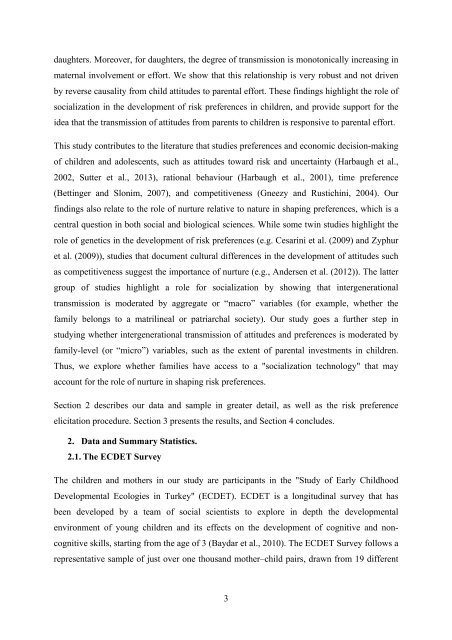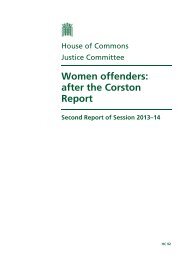Parental socialisation effort and the intergenerational transmission ...
Parental socialisation effort and the intergenerational transmission ...
Parental socialisation effort and the intergenerational transmission ...
- No tags were found...
Create successful ePaper yourself
Turn your PDF publications into a flip-book with our unique Google optimized e-Paper software.
daughters. Moreover, for daughters, <strong>the</strong> degree of <strong>transmission</strong> is monotonically increasing inmaternal involvement or <strong>effort</strong>. We show that this relationship is very robust <strong>and</strong> not drivenby reverse causality from child attitudes to parental <strong>effort</strong>. These findings highlight <strong>the</strong> role ofsocialization in <strong>the</strong> development of risk preferences in children, <strong>and</strong> provide support for <strong>the</strong>idea that <strong>the</strong> <strong>transmission</strong> of attitudes from parents to children is responsive to parental <strong>effort</strong>.This study contributes to <strong>the</strong> literature that studies preferences <strong>and</strong> economic decision-makingof children <strong>and</strong> adolescents, such as attitudes toward risk <strong>and</strong> uncertainty (Harbaugh et al.,2002, Sutter et al., 2013), rational behaviour (Harbaugh et al., 2001), time preference(Bettinger <strong>and</strong> Slonim, 2007), <strong>and</strong> competitiveness (Gneezy <strong>and</strong> Rustichini, 2004). Ourfindings also relate to <strong>the</strong> role of nurture relative to nature in shaping preferences, which is acentral question in both social <strong>and</strong> biological sciences. While some twin studies highlight <strong>the</strong>role of genetics in <strong>the</strong> development of risk preferences (e.g. Cesarini et al. (2009) <strong>and</strong> Zyphuret al. (2009)), studies that document cultural differences in <strong>the</strong> development of attitudes suchas competitiveness suggest <strong>the</strong> importance of nurture (e.g., Andersen et al. (2012)). The lattergroup of studies highlight a role for socialization by showing that <strong>intergenerational</strong><strong>transmission</strong> is moderated by aggregate or “macro” variables (for example, whe<strong>the</strong>r <strong>the</strong>family belongs to a matrilineal or patriarchal society). Our study goes a fur<strong>the</strong>r step instudying whe<strong>the</strong>r <strong>intergenerational</strong> <strong>transmission</strong> of attitudes <strong>and</strong> preferences is moderated byfamily-level (or “micro”) variables, such as <strong>the</strong> extent of parental investments in children.Thus, we explore whe<strong>the</strong>r families have access to a "socialization technology" that mayaccount for <strong>the</strong> role of nurture in shaping risk preferences.Section 2 describes our data <strong>and</strong> sample in greater detail, as well as <strong>the</strong> risk preferenceelicitation procedure. Section 3 presents <strong>the</strong> results, <strong>and</strong> Section 4 concludes.2. Data <strong>and</strong> Summary Statistics.2.1. The ECDET SurveyThe children <strong>and</strong> mo<strong>the</strong>rs in our study are participants in <strong>the</strong> "Study of Early ChildhoodDevelopmental Ecologies in Turkey" (ECDET). ECDET is a longitudinal survey that hasbeen developed by a team of social scientists to explore in depth <strong>the</strong> developmentalenvironment of young children <strong>and</strong> its effects on <strong>the</strong> development of cognitive <strong>and</strong> noncognitiveskills, starting from <strong>the</strong> age of 3 (Baydar et al., 2010). The ECDET Survey follows arepresentative sample of just over one thous<strong>and</strong> mo<strong>the</strong>r–child pairs, drawn from 19 different3
















